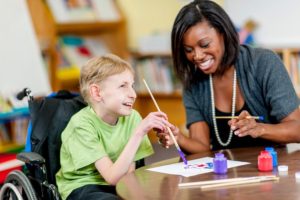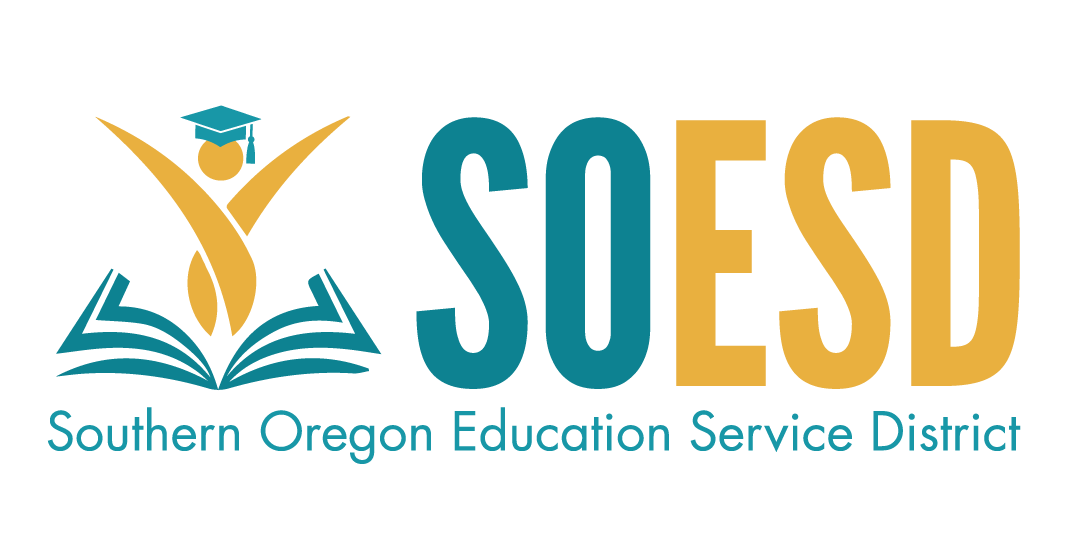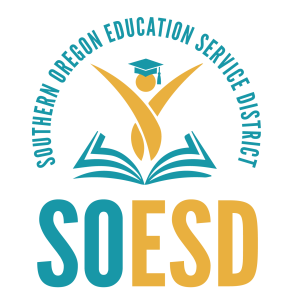 STEPS
STEPS
STEPS CARE (Comfort, Attention, and Response to Emergencies) serves students (ages 5-21) with severe and/or multiple disabilities, including intellectual disability, autism, orthopedic, traumatic brain injury, and medical health needs. The program is characterized by a low student:staff ratio, individualized special instruction, a modified curriculum, specialized equipment and materials, and a team of specialists providing additional instruction, therapy, and staff training and consultation to augment the variety of classroom-based services. Homebound services to STEPS CARE-eligible students and extended school year services are provided. Specialists include nurses, speech/language pathologists, Regional Inclusive Service providers, and vocational program specialists as well as supervisors who provide training and technical assistance to SOESD and building staff. Districts provide classroom space/facilities, school day transportation, building-level administrative support, and custodial services.
CONTACT
For more information, email:
steps@soesd.k12.or.us
541-776-8590 ext. 3137
STEPS Plus
 Students enrolled in this program represent a distinct population of students, who present difficult and challenging behaviors. They have multiple, severe disabilities, cognitive deficits and/or significant medical/health needs. The disabilities may include developmental/intellectual disability, hearing and/or vision impairment, communication needs, orthopedic impairment, traumatic brain injury, other health impairment, autism spectrum disorder, and behavioral challenges. Students’ projected achievement level does not typically exceed 2nd grade benchmarks. These students lack social, behavioral and communication skills required for success in other self-contained life skills classroom placements. Their behaviors are so severe that they require a staffing ratio of 1:1. Some of the students may require a 2:1 or higher staffing ratio in order to keep them safe and provide safety for the staff and other students.
Students enrolled in this program represent a distinct population of students, who present difficult and challenging behaviors. They have multiple, severe disabilities, cognitive deficits and/or significant medical/health needs. The disabilities may include developmental/intellectual disability, hearing and/or vision impairment, communication needs, orthopedic impairment, traumatic brain injury, other health impairment, autism spectrum disorder, and behavioral challenges. Students’ projected achievement level does not typically exceed 2nd grade benchmarks. These students lack social, behavioral and communication skills required for success in other self-contained life skills classroom placements. Their behaviors are so severe that they require a staffing ratio of 1:1. Some of the students may require a 2:1 or higher staffing ratio in order to keep them safe and provide safety for the staff and other students.
For these students, the program will focus on determining the cause of severe behaviors and teaching skills to communicate, self-regulate and manage behaviors in a more positive way. The program is characterized by a low student:staff ratio, individualized special instruction, special equipment and materials, and a team of specialists providing additional instruction, therapy, staff training, and consultation services. STEPS Plus uses evidence-based curriculum to teach fundamental behavioral communication goals (e.g. using picture cues to request), and it implements sensory strategies to help children tolerate typical environmental stimuli and adult-supported behavioral regulation. STEPS Plus programming does not include a ‘levels’ type of behavioral system, appropriate for students with more sophisticated cognitive capacity. The focus is on teaching behavior management and social and communication skills to students so they can function more independently and eventually be placed in a less restrictive environment, whether it is a regular self-contained life-skills class, community, recreation, or a work program. It is understood that some students may continue to require the highly structured environment and 1:1 staffing to be successful in the learning environment.
Long Term Care and Treatment (LTCT)
Long Term Care and Treatment (LTCT) provides education programs for students who have been placed by state agencies, school districts, or private placement in day and residential treatment facilities. The goal of Long Term Care and Treatment Education Programs is to provide a high quality, therapeutic environment where children will gain the behavior skills and abilities to function successfully in a non-institutional environment.
CONTACT
LTCT@soesd.k12.or.us
541-776-8590 ext. 3137
Transition Network Facilitator -Region V
The role of the Transition Network Facilitator (TNF) is to support the Governor’s Executive Order 15-01 to further improve Oregon’s systems of designing and delivering employment services for students with disabilities. The TNF works to support the collaborative efforts of Vocational Rehabilitation and Local Education Agencies in Oregon in the implementation of the Workforce Innovate Opportunity Act and the provision of Pre Employment Transition Services (Pre-ETS).
- Offer technical assistance to educators for students with disabilities who are of transition age.
- Develop strategies for successful team facilitation and planning.
- Continue to develop relationships with community partners such as Vocational Rehabilitation, Developmental Disabilities Service, County Mental Health, family advocacy programs, etc.
- Implement training and professional development for regional partners on policy and systems change.
- Provide support to districts in understanding Pre-Employment Transition Services (PRE-ETS).
- Provide Curriculum to check out and resources
Participating counties are Jackson, Josephine and Klamath.
Youth Employment Services
The Youth Employment Services (YES) is a comprehensive transition program for youth with disabilities operated collaboratively by Vocational Rehabilitation Services (VR), the Oregon Department of Education (ODE), and local school districts statewide in Oregon. The purpose of the program is to prepare youth with disabilities for employment or career related post-secondary education or training.
Participants: YES serves youth with disabilities who need additional support, beyond the services typically offered though the general or special education program, to achieve their secondary and post-secondary employment and continuing education goals. YES youth are representative of all youth with disabilities nationally with respect to gender and primary disability categories; however, the majority of youth in the program experience a number of additional individual, family, or school system barriers such as poor academic skills, limited social and independent living skills, negative job experiences, and low levels of family involvement or support. Over 50% of youth currently served through the YES live in low income families.
Pre-Employment Transition Services: Workforce Innovation and Opportunity Act (WIOA) – Creates the expectation that VR in collaboration with local educational agencies (LEA) shall provide or arrange for the provision of pre-employment transition services for all students with disabilities in need of such services who are eligible or potentially eligible for VR services. The 5 pre-employment transition services (Pre-ETS) offered are:
- Job exploration counseling
- Work-based learning experiences, which may include in-school or after school opportunities, or experience outside the traditional school setting (including internships), that are provided in an integrated environment to the maximum extent possible
- Counseling on opportunities for enrollment in comprehensive transition or post-secondary educational programs at institutions of higher education
- Workplace readiness training to develop social skills and independent living
- Instruction in self-advocacy which may include peer mentoring.

